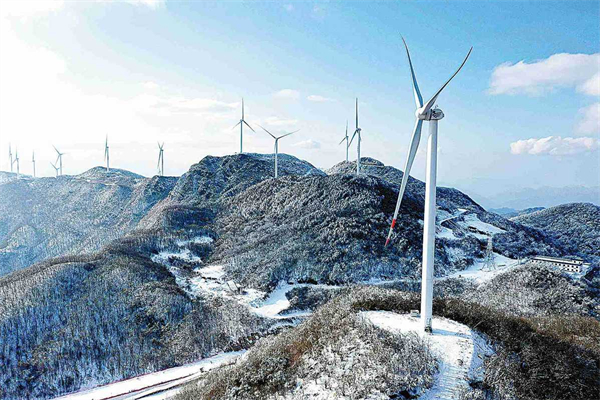In Xinjiang, prosperity follows electricity

Turbines at a wind farm are seen in Xiangyang, Hubei province, on Feb 3. [Photo by Yang Tao/for China Daily]
With electricity, Janbay Alip can now take a hot shower at home at any time.
In addition to the shower, Janbay's home has been equipped with a rice cooker, freezer, electric kettle, oven and heating.
"Now I have almost all the necessary electrical equipment at home," said Janbay, a resident of Smehana village in Wuqia county, Xinjiang Uygur autonomous region.
Smehana is the westernmost village in the country. It is the place in China where the sun rises and sets latest.
"Since there has been stable voltage, electricity can be used for 24 hours, and there is no fear of electrical appliances being burnt out anymore," Janbay said.
Janbay recalled that people used to live in the dark at night before his village was connected with the State Grid more than a decade ago. They had to use candles and oil lamps made of sheep oil and cotton, as well as diesel generators.
"Without electricity, it would be dark at 9:30 in winter, and then we could do nothing," he said.
Great changes have taken place since the village's electrical supply was linked to the grid in 2013.
After the electrification, e-commerce services have been available in Smehana village, and a variety of goods, including instant noodles, drinks, snacks, detergent and other daily use articles have come to the shelves of the village's supermarket.
The opening of supermarkets has greatly facilitated the lives of residents, he said.
Mamatmusa Qih, a store manager, said that in addition to purchasing daily necessities, the village's supermarket has become an e-commerce outlet where train and air tickets can be purchased.
He said he earned more than 40,000 yuan ($5,926) last year, and the supermarket gave him job opportunities and a stable income.
Meanwhile the village's tourism and homestay industries have seen rapid growth over the previous decade.
Mamatnur Akim, who was a herdsman before the coming of electricity, started an agritainment business — operating a pasture and providing accommodations, catering and entertainment services for tourists.
Last year, he earned 15,000 yuan.
Mamatnur said he would rebuild his house this year to provide separate bathrooms and kitchens for tourists, hoping to make those who come for sightseeing more comfortable.
As of March, he has received six groups of tourists, mostly from outside Xinjiang, he said.
Ren Junjie, Party chief of Smehana, said the village received more than 2,000 tourists from outside Xinjiang in 2022. Homestays will become a major attraction in the months to come, Ren said.
To this end, all the scattered houses in the village will be transformed and restricted into homestays to meet the growing demand, he added.
 Attractions
Attractions Dining
Dining Culture
Culture